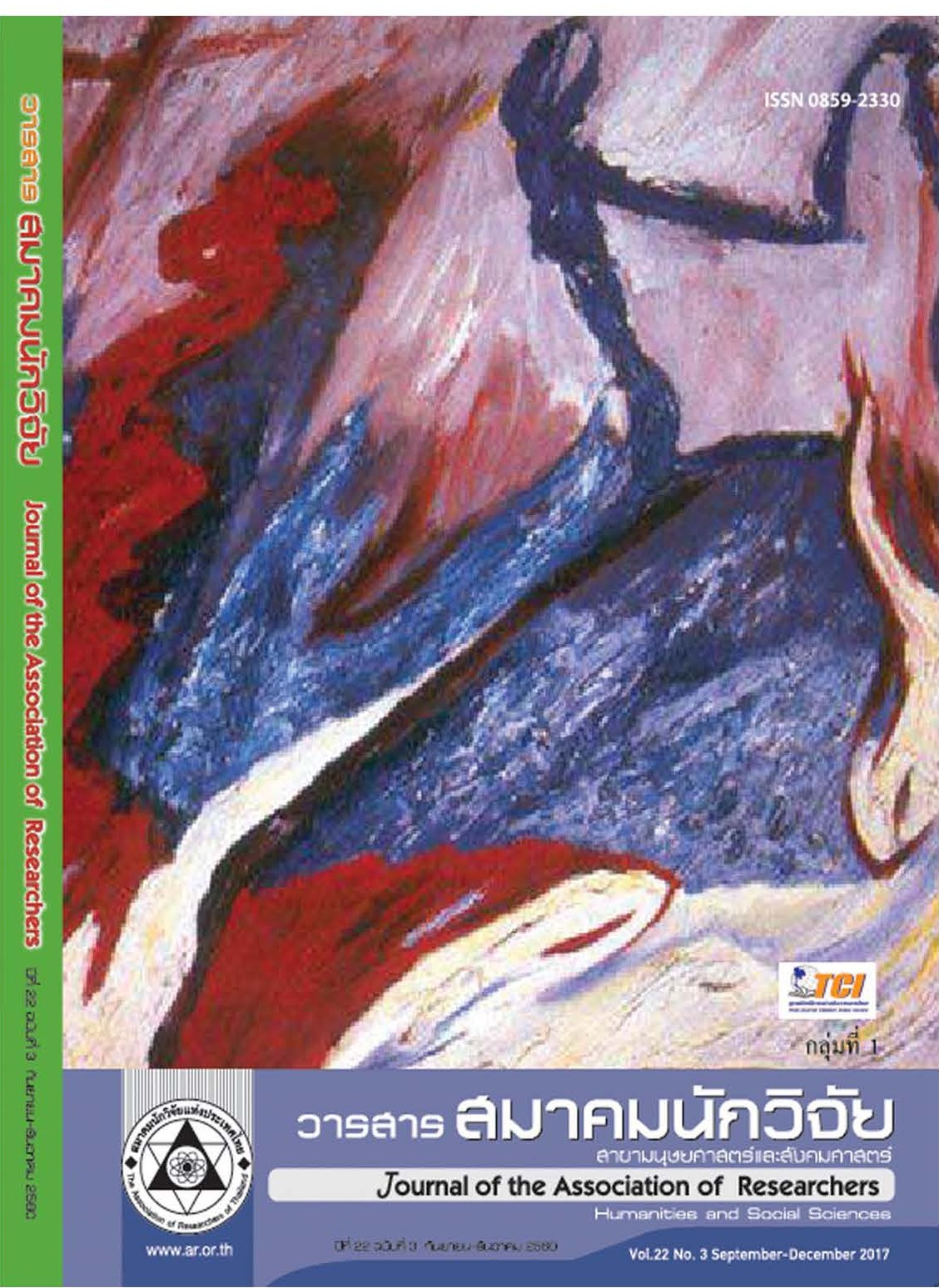Development of Semester Beginning and Ending Policy of the Ministry of Education in Thai Context
Main Article Content
Abstract
The objectives of this study were (i) to explore problems of semester beginning and ending the policy of the Ministry of Education in accordance with Thai context, and (ii) to provide the development guidelines of semester beginning and ending policy in accordance with Thai context. The methodology of this research was qualitative research using a semi-structured in-depth interview form as a research tool of data collection from 20 experts or key informants. The data collection by interview was conducted from April to May 2015.
Findings of this research indicated that the major problem of semester beginning and ending the policy of the Ministry of Education was the Council of University Presidents of Thailand's placing no importance on opening the opportunity for people affected from the policy to participate in policy formulation widely, such as no public hearing from people sector but from a small group of academician. In order to improve the policy, the Ministry of Education should place importance on the democratic principle supporting people's participation widely and continuously. In the meantime, the Ministry of Education should cooperate with the related agencies of public and private sectors, citizens, and non-government organizations to exercise open system evaluation on the policy formulation or policy-making decision on the semester beginning and ending of the Council of University Presidents of Thailand. Moreover, the Ministry of Education should establish the development model of semester beginning and ending policy comprising of people participation, environmental analysis, and formulation policy concept. The model finally is appropriately applied as guidelines, performance procedures, and/or key performance indicators (KPIs) to support the semester beginning and ending policy formulation of the Ministry of Education in Thailand.
Article Details
บทความที่ปรากฏในวารสารนี้ เป็นความรับผิดชอบของผู้เขียน ซึ่งสมาคมนักวิจัยไม่จำเป็นต้องเห็นด้วยเสมอไป การนำเสนอผลงานวิจัยและบทความในวารสารนี้ไปเผยแพร่สามารถกระทำได้ โดยระบุแหล่งอ้างอิงจาก "วารสารสมาคมนักวิจัย"
References
กรมอาเซียน กระทรวงการต่างประเทศ. (2552), อาเซียน. สืบค้นวันที่ 12 พฤษภาคม 2558 จาก http://www.mfa.go.th/asean
คนึงนิจ ศรีบัวเอี่ยม และคณะ. (2545). แนวทางการเสริมสร้างประชาธิปไตยแบบมีส่วนร่วมตามรัฐธรรมนูญแห่งราชอาณาจักรไทย พุทธศักราช 2540: ปัญหา อุปสรรค และทางออก, กรุงเทพฯ : ธรรมดาเพรส
เดชรัต สุขกําเนิด. (2547). นโยบายสาธารณะกับสุขภาพของคนไทย. กรุงเทพฯ : อุษาการพิมพ์
ธนสาร บัลลังก์ปัทมา. (2551). บทบาทประชาชนในการมีส่วนร่วมจัดการศึกษา : หลักการมีส่วนร่วม คือ หลักร่วมคิด ร่วมทํา ร่วมตรวจสอบ ร่วมรับผิดชอบ. The City Journal, 4(25): 30
ประทุมทิพย์ ทองเจริญ. (2555) วิเคราะห์ Top Down/Bottom p. สืบค้นเมื่อวันที่ 11 พฤษภาคม 2558 จาก http://yim-siam-imagination hasnolimit.blogspot.com/2012/06/top-down-bottom-up.html.
ประเวศ วะสี. (2549) กระบวนการนโยบายสาธารณะ พิมพ์ครั้งที่ 2 กรุงเทพฯ : มูลนิธิสาธารณสุขแห่งชาติ
ประสงค์ กัลยาณะธรรม. (2554). กระบวนการกําหนดนโยบายการศึกษาในแผนพัฒนาเศรษฐกิจและสังคมแห่งชาติ ฉบับที่ 10. ดุษฎีนิพนธ์หลักสูตรปรัชญาดุษฎีบัณฑิต สาขาการบริหารการศึกษา มหาวิทยาลัยศิลปากร
วิรัช วิรัชนิภาวรรณ. (2559). 50 แนวคิด ตัวชี้วัด ตัวแบบของการบริหารจัดการ และการบริหารจัดการที่ยั่งยืน, กรุงเทพฯ : โฟร์เทพฯ
สมเกียรติ ตั้งกิจวานิชย์. (2551). การวิจัยนโยบายสาธารณะในประเทศไทย: ประเด็นที่ควรรู้และข้อคิดสถาบันวิจัยเพื่อการพัฒนาประเทศไทย (ทีดีอาร์ไอ), กรุงเทพฯ : สถาบันวิจัยเพื่อพัฒนาประเทศไทย
Anderson, J. E. (2010). Public Policy-making, (7th ed.). New York: Praeger. Biernacki, P. & Waldorf, D. (1981). Snowball sampling: Problems and techniques of chain referral sampling. Sociological Methods & Research, 10 (2): 141-163.
Creswell, J.W. (2002). Educational Research, Planning, Conducting and Evaluating Quantitative and Qualitative Research. New Jersey: Merrill Prentice Hall.
Department of ASEAN, Ministry of Foreign Affairs. (2015). ASEAN. Retrieved May 12, 2015, from http://www.mfa.go.th/asean (in Thai)
Decharut Sukkumnoed. (2004). Public Health and Public Policy. Bangkok: USA Press. (in Thai).
Dye, T. R. (2013). Understanding Public Policy, (14th ed.). Upper Saddle River, New Jersey: Prentice-Hall.
Easton, D. (1953). The Political System: An Inquiry into the State of Political Science. New York: Knopf
Kanungnit Sribua-iem, Thawanrat Worathepvothipong, & Pisit Sukreeyapong. (2002). The direction of the Promotion of Participatory Democracy under the B.E. 2540 Constitution of the Kingdom of Thailand: Problems, Obstacles, and Solutions. Bangkok: Thammadapress. (in Thai)
Pratumtip Thongchareon. (2015). Top-Down/Bottom-Up Analysis. Retrieved May 11, 2015, from http://yim-siam-imaginationhasnolimit.blogspot.com/2012/06/top-down-bottom-up.html (in Thai).
Prasong Kunlayanatham. (2011). The process of setting educational policy in the National Economic and Social Development Plan No. 10. Doctor of Philosophy Program in Education. Educational Administration Branch Silpakorn University. (in Thai).
Pravet Vasi (2006). Public Policy Process, (2nd ed.). Bangkok: National Health Foundation. (in Thai).
Nakamura R. T. and Smallwood F. (1980). The Politics of Policy Implementation. New York: St. Martin's Press.
Somkiat Tangkitvanich. (2008). Public Policy Research in Thailand: Issues to Understand and Comments. Bangkok: Thailand Development Research Institute (TDRI). (in Thai)
Theodoulou, S. Z. & Cahn. M.A. (2013). Public Policy: The Essential Readings. New Jersey: Pearson
Education. Mazmanian, D. A. & Sabatier, P. A. (1989). Implementation and Public Policy: With a New Postscript. Latham, MD: University Press of America.
Middleton J. (2003). The Ultimate Strategy Library: the 50 Most influential Strategic Ideas of All Time.
Oxford: Capstone. Ministry of Education. (2015). The Authority and Responsibility of the Ministry of Education. Retrieved May 14, 2015, from http://www.moe.go.th/main2/authority42.htm (in Thai).
Wiruchnipawan. (2016). 50 Concepts, Indicators, Models of Management Administration and Sustainable Management Administration. Bangkok: Propage publishing.


